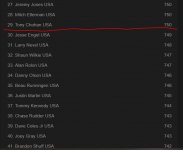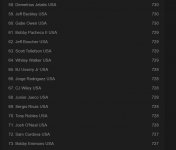In my state our most prominent tournament promoter released their full ABCD rating list for their events. I of course downloaded the PDF immediately, converted it to a spreadsheet, wrote an algorithm to pull FargoRates on every entry, removed everyone with less than 200 games, removed all obvious mismatches based off location, and removed all outliers.
So now I have data on how our ratings in Michigan align to FargoRate. Note that most players don’t have an established rating because FR is still new here. But enough did to do analysis. Here’s the average FR for each ABCD rating in Michigan.

Sent from my iPhone using Tapatalk Pro
So now I have data on how our ratings in Michigan align to FargoRate. Note that most players don’t have an established rating because FR is still new here. But enough did to do analysis. Here’s the average FR for each ABCD rating in Michigan.

Sent from my iPhone using Tapatalk Pro


